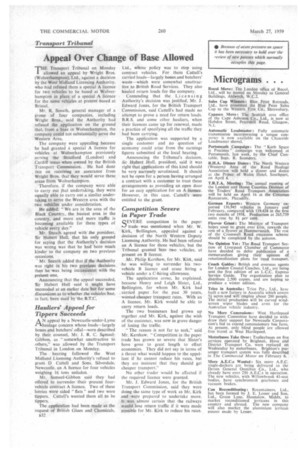Appeal Over Change of Base Allowed
Page 66

If you've noticed an error in this article please click here to report it so we can fix it.
THE Transport Tribunal on Monday
allowed an appeal by Wright Bros. (Wolverhampton), Ltd., against a decision by the West Midland Licensing Authority, who had refused them a special A licence for two vehicles to be based at Wolverhampton in place of a special A licence for the same vehicles at present based at Bristol.
Mr. R. Sneath, general manager of a group of four companies, including Wright Bros., said the Authority had refused the application on the ground that, from a base in Wolverhampton, the company could not substantially serve the Western Area.
The company were appealing because he had granted a special A licence for vehicles at Wolverhampton previously serving the Stratford (London) and Cardiff areas when owned by the British Transport Commission. He had done this on receiving an assurance from Wright Bros. that they would serve these areas from Wolverhampton.
. Therefore, if the company were able to carry out that undertaking, they were equally able to carry out a similar undertaking to serve the Western area with the two vehicles under consideration.
He added: "We are in the area of the Black Country, the busiest area in the country, and more and more traffic is becoming available for these types of vehicle every day."
Mr. Sneath agreed with the president. Sir Hubert Hull, that his only ground for saying that the Authority's decision was wrong was that he had been much kinder to the company on two previous occasions.
• Mr. Sneathadded that if the Authority was right in his two previous decisions then he was being inconsistent with the present one.
Announcing that the appeal succeeded, Sir Hubert Hull said it might have succeeded at an earlier date but for some discussions as to whether The vehicles had, in fact, been used by the B.T.C.
Hauliers' Appeal for Tippers Succeeds
AN appeal by a Newcastle-under-Lyme haulage concern whose loads—largely bones and butchers' offal—were described by their counsel, Mr. J. R. C. SamuelGibbon, as "somewhat unattractive to others," was allowed by the Transport Tribunal in London on Monday.
The hearing followed the West Midland Licensing Authority's refusal to grant D Cattell and Sons. Silverdale, Newcastle, an A licence for four vehicles weighing 16 tons unladen.
Mr. Samuel-Gibbon said they had offered to surrender their present fourvehicle contract A licence.. Two of these lorries were sided " flats " and two were tippers. Cattell's wanted them all to be tippers.
The application had been made at the request of British Glues and Chemicals. a32 Ltd., whose policy was to stop using contract vehicles. For them Cattell's carried loads—largely bones and butchers' waste—winch were somewhat unattractive to British Road Services. They also hauled return loads for the company.
Contending that the Licensing Authority's decision was justified, Mr. J. Edward Jones, for the British Transport Commission, said Cattell's had made no attempt to prove a need for return loads. B.R.S. and some other hauliers, when their licences came up for renewal, made a practice of specifying all the traffic they had been carrying.
The application was supported by a single customer and no question of economy could arise from the earnings figures submitted at the local hearing.
Announcing the Tribunal's decision, Sir Hubert Hull, president, said it was right that applications of this kind should be very narrowly scrutinized. it should not be open for a person having arranged a contract with a customer to treat these arrangements as providing an open door for an easy application for an A licence. However, in this case. Cattell's were entitled to the grant.
Competition Severe in Paper Trade
QEVERE competition in the paper sif trade was mentioned when Mr. W. Kirk, Bollington, appealed against a decision of the North Western Deputy Licensing Authority. He had been refused an A licence for three vehicles, but the Tribunal granted him two vehicles, at present on B licence.
Mr. Philip Kershaw, for Mr. Kirk, said he was willing to surrender his twovehicle B licence and cease hiring a vehicle under a C-hiring allowance.
The application arose, he explained, because Henry and Leigh Slater, Ltd., Bollington, for whom Mr. Kirk had carried paper for the past 30 years, wanted cheaper transport rates. With an A licence, Mr. Kirk would be able to carry return loads.
The two businesses had grown up together And Mr. Kirk, against the wish of the customer, was now in grave danger of losing the traffic.
"The reason is not far to seek," said Mr. Kershaw. "Competition in the paper trade has grown so severe that Slater's have gone to great length to effect economies. They did not say in terms of a threat what would happen to the appellant if he cannot reduce his rates, but they are insistent that they should get cheaper transport."
No other trader would be affected if the required licence were granted.
Mr. J. Edward Jones, for the British Transport Commission, said they were doing the same type of work as Mr. Kirk and were prepared to undertake more. It was almost certain that the railways would lose return traffic if it were made possible for Mr. Kirk to reduce his rates.




































































































